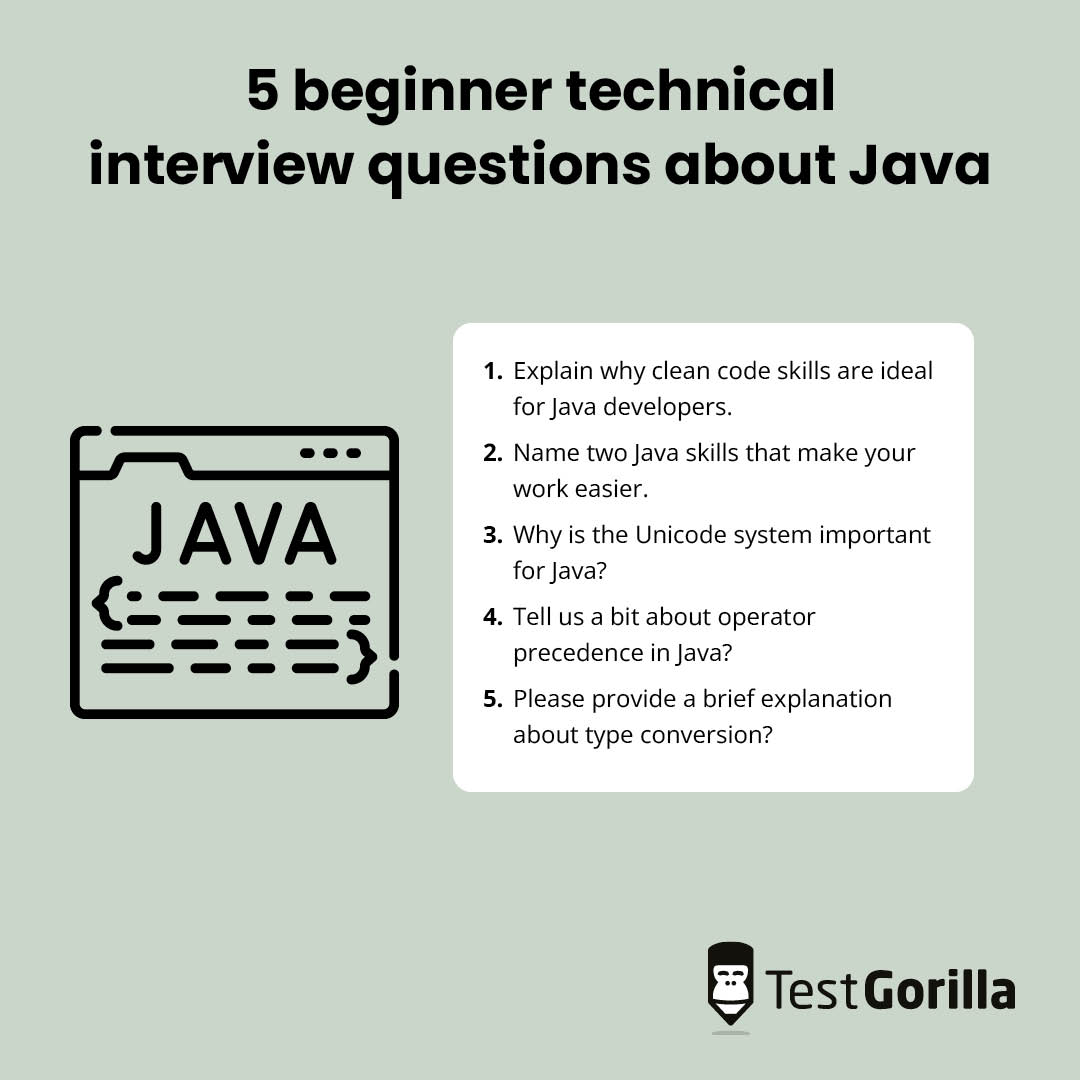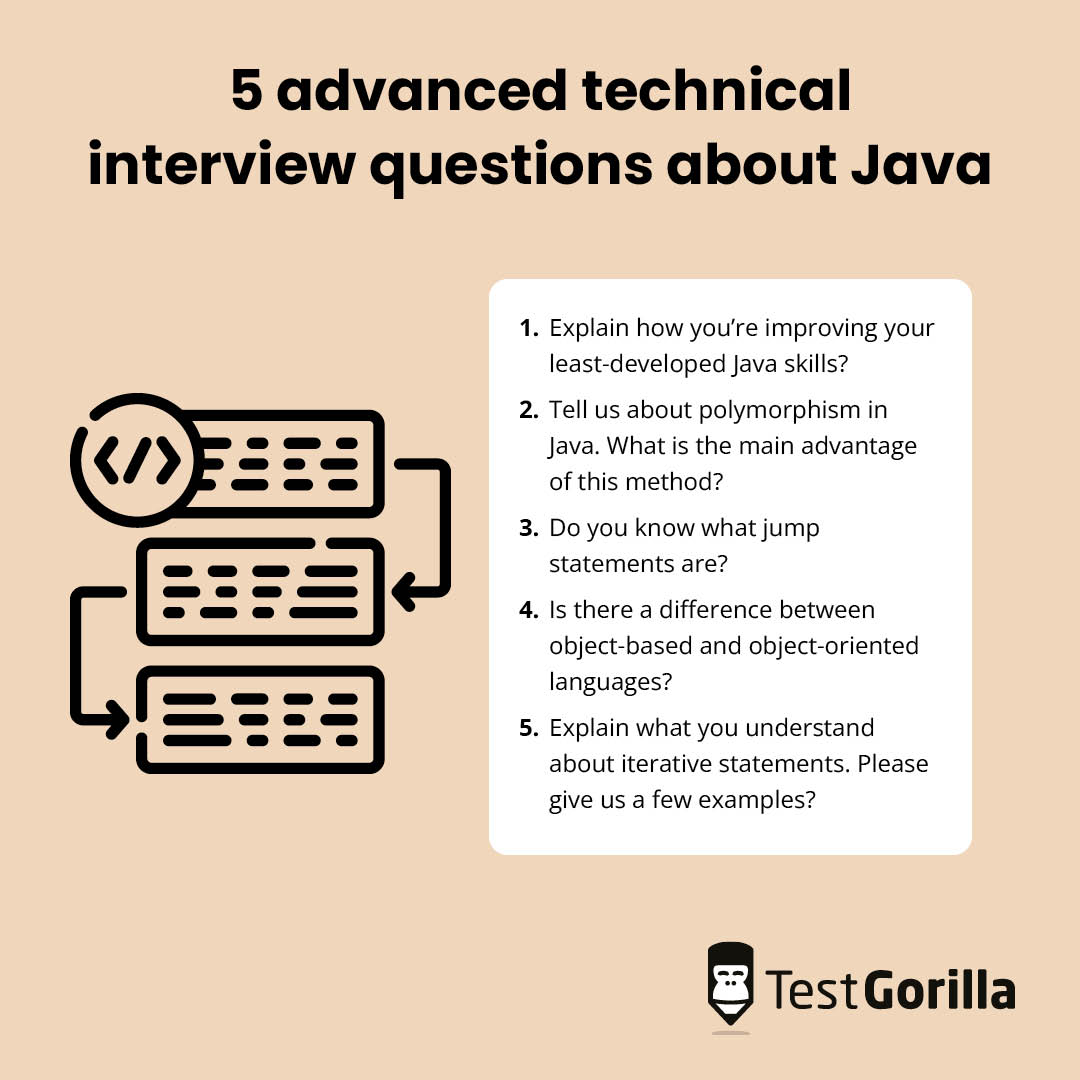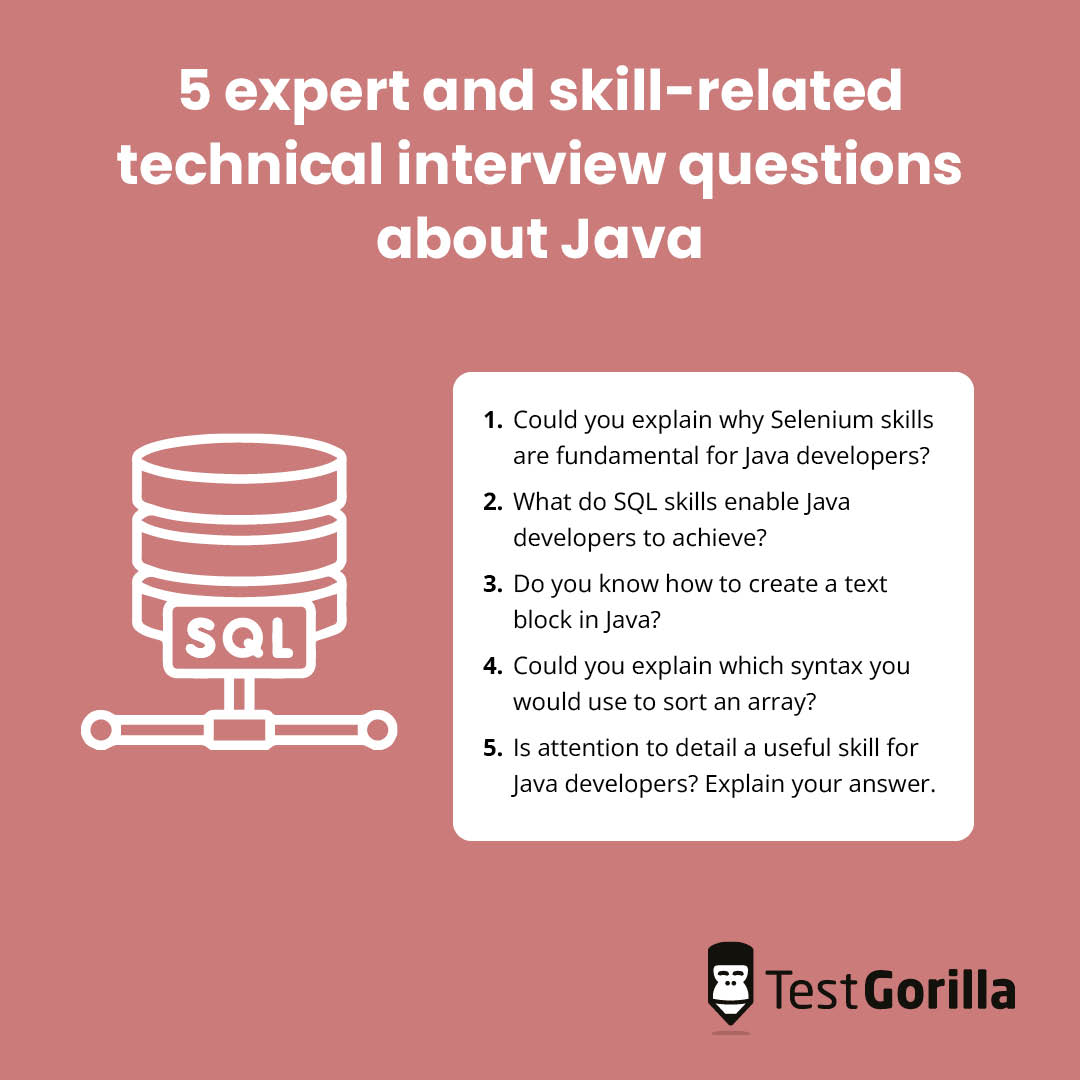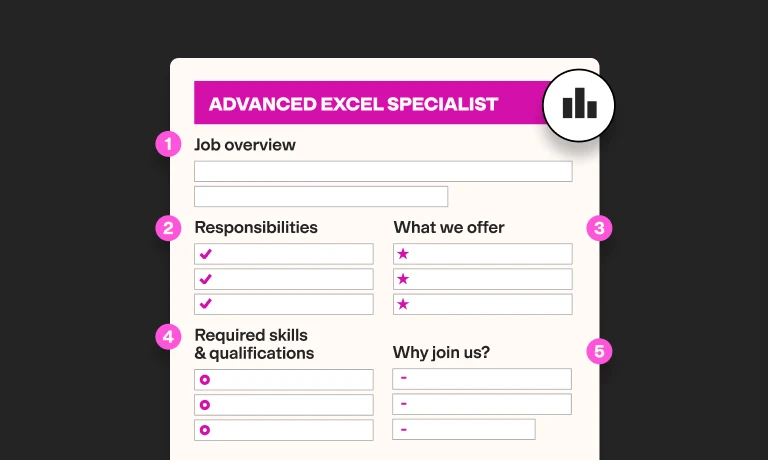101 technical interview questions about Java to ask your applicants
If you need to hire a Java developer, testing their technical skills is beneficial. Technical skills and knowledge can make the difference between flawless application creation and producing apps that fail to impress your clients.
Two ways to assess a Java developer’s technical skills include using a Java skill test in an assessment and interviewing your applicants with technical interview questions about Java. But what’s the best place to find these interview questions?
You’ll find 101 technical interview questions about Java in this article – read on to discover them.
Table of contents
- 30 beginner technical interview questions about Java
- 5 beginner technical interview questions about Java and sample answers
- 23 technical interview questions about Java to ask mid-level and experienced candidates
- 5 advanced technical interview questions about Java and sample answers
- 48 expert and skill-related technical interview questions about Java
- 5 expert and skill-related technical interview questions about Java and sample answers
- How should you include skill assessments and technical interview questions about Java in the hiring process?
- Hire a pro-Java developer with technical interview questions about Java
30 beginner technical interview questions about Java
Starting the interview with beginner technical interview questions about Java can give you a general idea of your candidates’ experience. Ask them some of these questions to learn more.
Please provide a brief description of how engineers created Java.
Tell us a bit about Java. What do you know about it?
Do you have Java experience? Tell us about some Java projects you worked on.
Name two Java skills that make your work easier.
Please explain a couple of differences between Java and C.
Are you familiar with the crucial features of Java? Describe three of them.
Do you know which memory areas the JVM allocates?
What do you understand about the JVM class loader?
Have you used the JDK before? Do you know what it does to the JVM and JRE?
Have you used JRE tools before? Why are they important?
In which situation would you use the JIT compiler?
Tell us about variables in Java. What do you know about them?
Are you familiar with the main three types of variables in Java?
Tell us about typecasting in Java. What do you understand about it?
What do you understand about Java classes? Tell us what you know about them.
What do you understand about Java objects? Tell us what you know about them.
Could you provide a brief explanation about type conversion? What does this mean?
Can you tell me what data types are in Java?
Are you familiar with primitive data types? Explain what these are.
Are you familiar with non-primitive data types? Explain what these are.
Do you know which syntax and keyword is ideal for object declaration in Java?
What do you know about the Unicode system? Can you tell us about it?
Why is the Unicode system important for Java?
What does ‘run anywhere’ mean in the context of Java?
Do the keywords exit and next exist in Java?
Explain why clean code skills are ideal for Java developers.
Do you know if local variables have a default value? Explain your answer.
Could you tell us about operators in Java? How many are there?
Can you tell us a bit about operator precedence in Java? What does this mean?
Are you familiar with the main logical operators in Java? Explain the main three types.
5 beginner technical interview questions about Java and sample answers
When you check your candidates’ answers, refer to the sample answers to these five beginner technical interview questions about Java.
1. Explain why clean code skills are ideal for Java developers.
Clean code skills are essential for Java developers for a couple of key reasons. They ensure their code is bug- and error-free. Candidates with advanced clean code knowledge will understand that using the correct syntax rules can make the code easy to maintain.
The ideal ways Java developers can write clean code include to:
Use the correct structure for their code
Use descriptive names
Use consistent formatting methods
Avoid using several parameters in a method
Avoid hardcoding
Since clean code has many advantages, it’s worth checking if applicants have clean coding skills. Before the interview, use our Clean Code skill test to gather quantitative data about your candidates’ knowledge.
2. Name two Java skills that make your work easier.
It’s ideal to look for candidates whose Java skills enhance their work and productivity, and asking applicants this question will help you learn if they’ve got such skills.
Some top candidates might mention that their DevOps skills help them complete continuous deployment. Others may explain that their React framework knowledge facilitates web and mobile Java app creation. But responses will vary.
DevOps and React framework skills enhance productivity and app creation, and 47% of developers use DevOps for software development.
Therefore, it’s crucial to check if your applicants have honed these Java-related skills with a DevOps or React Native skill test. These tests will give you a percentage that matches your applicants’ expertise – they’re ideal for verifying that DevOps and React are their most advanced skills.
3. Why is the Unicode system important for Java?
The Unicode system helps correct Java’s previous language standards issues. Your best candidates will have no problems specifying how Unicode handles the character default size problems from previous systems. They’ll mention that its two-byte character default size perfectly matches Java’s requirements for two-byte characters.
4. Can you tell us a bit about operator precedence in Java? What does this mean?
A couple of rules and regulations that Java provides include the operator precedence standard, which candidates should know about. This rule states that if an expression has several operators, the operator precedence checks all operators. It determines which operator executes first based on their priority level.
Candidates might discuss operator priorities if they’re keen to share more knowledge. For instance, they’ll know that subtraction and addition operators have less priority than multiplication.
5. Could you provide a brief explanation about type conversion? What does this mean?
One simple definition of type conversion is a process in which a compiler converts one data type to another. If your applicants have advanced experience with type conversion, they’ll be able to mention the two examples of type conversions – implicit and explicit type conversion.
The best insights on HR and recruitment, delivered to your inbox.
Biweekly updates. No spam. Unsubscribe any time.
23 technical interview questions about Java to ask mid-level and experienced candidates
If you’re interviewing mid-level and experienced candidates, don’t miss these 23 technical interview questions about Java. Use some of them in the interview to assess your applicants.
Do you understand prefixes and postfix increments? What do these do?
Could you tell me about a few bitwise operators in Java?
Give us some facts on ternary operators in Java. What is the syntax for this operator?
Tell us about your experience using Java keywords. Could you name a few?
Tell us about your experience with access specifiers in Java.
Name a few selection statements in Java. What is an alternative name for these?
Do you know what jump statements are? Can you tell us the two main types?
Tell us some information about while loops. What do these do?
Tell me some facts about do-while loops. What do these do?
Is there a difference between do-while and while loops? Explain your answer.
Do you have experience with abstraction? Can you explain what this means?
Do you have experience with encapsulation? Can you explain what this means?
Tell us about polymorphism in Java. What is the main advantage of this method?
Why are OOPs beneficial? Explain your answer.
Is there a difference between object-based and object-oriented languages?
Do you know what a naming convention is in Java? Could you explain it?
Are you familiar with the rules engineers must follow when declaring a class?
Give us some facts about default constructors.
Give us some information about parameterized constructors.
What kind of value does a constructor return?
Could you tell us what method in Java means and explain why it’s important?
Can you explain how you’re improving your least-developed Java skills?
Explain what you understand about iterative statements. Can you give us a few examples?
5 advanced technical interview questions about Java and sample answers
With the sample answers to these five advanced technical interview questions about Java, you’ll have no problem assessing your candidates’ responses. Check them and use them after the interview.
1. Can you explain how you’re improving your least-developed Java skills?
It’s always a testament to your applicants’ character and determination if they want to improve their Java skills. It can help enhance their output and productivity, so you’re looking for top candidates who have methods to hone the skills they practice less often.
A few applicants might be interested in your training programs to get better, but others might prefer to work on Java projects in their own time. Some will attend courses to enhance their knowledge – others may look at forums to learn technical strategies to develop flawless applications. If they’re interested in improving, their responses will show their enthusiasm.
Don’t forget that you can use our programming skill tests to assess your applicants’ Java-related skills and check if they’re suitable for your team.
2. Tell us about polymorphism in Java. What is the main advantage of this method?
Even though polymorphism might look like a complex term, Java developers with the correct expertise will know what it means. Listen out for responses that mention that polymorphism is a process systems use to perform a single task in different ways.
The most in-depth responses will refer to method overloading and overriding techniques, providing an example of polymorphism in action. For instance, if a developer has a chocolate class with a flavor method, the method can complete one action in different ways. This different implementation occurs if two syntaxes feature two different subclass inheritances, such as orange and strawberry.
3. Do you know what jump statements are? Can you tell us the two main types?
Java developers can use jump statements to transfer control to a different part of their program. These statements work based on the conditions the programmer specifies.
Skilled and experienced candidates can mention the two jump statements available in Java – break and continue.
4. Is there a difference between object-based and object-oriented languages?
The simple answer to this technical interview question about Java is that there’s one key difference between object-based and object-oriented languages. Object-based languages help developers adhere to object-oriented programming (OOP) concepts except for inheritance, and object-oriented languages encompass every OOP concept.
To show their expertise, candidates might list object-based and object-oriented programming languages. For instance, they could mention that JavaScript is an object-based programming language and Java is an object-oriented programming language. If they know that Java is the second most popular programming language in 2023, they’re ones to consider for your role.
5. Explain what you understand about iterative statements. Can you give us a few examples?
A Java iterative statement is a statement that loops and repeats to execute a block of statements. It only stops repeating when the program meets the termination condition. Checking if your applicants can name a few iterative statements is important to test their knowledge – the Java experts among your candidates will name the following examples:
Do-while loop
While loop
For loop
48 expert and skill-related technical interview questions about Java
Include some of these 48 expert, skill-related technical interview questions about Java in your interview process to find out more about your candidates' abilities and knowledge.
Which key factors make methods different from constructors?
Could you give us some information about method signatures in Java?
What function do static keywords have in Java? Explain your answer.
What is the consequence of declaring methods as static?
What are a few restrictions of declaring methods as static?
Do you know if you can execute programs without implementing the main method?
Can developers declare constructors with static methods? Explain your answer.
Can developers make an abstract method static? Please explain your answer.
What are the two main advantages of using inheritance in Java?
Please write the correct syntax for inheritance in Java.
Have you used the Math.random() method before? What does it do?
Could you tell us why Java cannot support multiple inheritances?
Do you know whether Java classes can have several constructors?
What do you know about method overriding? When does this happen in Java?
Do you know if virtual functions are possible in Java?
Tell us some facts about the super keyword in Java. When should you use it?
Can you explain if Java supports pointers? Why or why not?
When would you notice aggregation in Java?
When would you notice composition in Java?
Can you reverse strings in Java? Explain your answer.
Can developers swap numbers and avoid using a third variable?
Which syntax would you use to check if an integer list features odd numbers?
Do you know how to remove a string’s spaces in Java? Explain how.
What do you know about implementing binary searches in Java?
Which method would you use to print a date in a specific format?
Do you know how to merge a couple of lists in Java? Write your answer.
Do you understand how to create records in Java? Write your answer.
Do you know how to create a text block in Java? Write your answer.
Which approach would you use to make a functional interface?
How would you use lambda expressions in Java? Write your answer.
Could you explain which syntax you would use to sort an array?
Explain why code version control is crucial for Java developers.
Could you explain why Selenium skills are fundamental for Java developers?
Why should Java developers understand Kubernetes and have skills for using it?
Is big data knowledge important for Java developers?
Could you explain why communication skills are critical for Java developers?
Tell us about your DevOps knowledge and why it’s essential for Java developers.
What do SQL skills enable Java developers to achieve?
What do Spring skills enable Java developers to achieve?
How do Git skills make Java program development easier?
Should Java developers have application programming interface skills? Explain why.
Why are machine learning skills useful for Java developers?
Could you explain whether React user interface framework skills are important?
How do AWS skills help Java developers?
Can you name a few time management skills that help developers complete tasks?
Is attention to detail a useful skill for Java developers? Explain your answer.
Should Java developers have problem-solving abilities? Why or why not?
How does critical thinking help Java developers create applications?
5 expert and skill-related technical interview questions about Java and sample answers
If you need to check the accuracy of your interviewee’s responses, check out the sample answers to these five expert and skill-related technical interview questions about Java.
1. Could you explain why Selenium skills are fundamental for Java developers?
The great thing about Selenium skills is that Java developers can test JSP pages and web applications without running them in a browser. Since Selenium also supports many test activities, the tool is versatile and useful.
But can your applicants name some of the test activities Selenium offers and specify why Selenium is ideal for Java programmers? To emphasize their expertise, they can mention a few examples like the ability to:
Complete building processes
Test applications
Handle defect tracking
Conduct analysis
Selenium skills are simple to assess with our Selenium skill test. Integrate this technical, data-driven test into your assessment for a quick and thorough candidate review.
2. What do SQL skills enable Java developers to achieve?
What’s ideal about SQL skills is that they help Java developers interact with databases to store, manipulate, and organize data. Since Java developers may need to improve their application’s performance, it’s beneficial if they know how SQL works with the Java database connectivity API to retrieve data successfully.
A quick way to assess your applicants’ SQL skills is to use our SQLite test before the interview stage.
3. Do you know how to create a text block in Java? Write your answer.
Applicants may know that engineers added a text blocks feature to Java 15, so there is an easy way to make a text block in Java. Listen out for responses that mention that the syntax should feature a multiline string inside an opening and closing pair of triple-double quotes.
If you ask applicants to provide a written answer, consider if they write something similar to the following syntax:
String textBlock = “““
Bye
Goodbye
No””” ;
4. Could you explain which syntax you would use to sort an array?
A couple of methods are ideal for sorting arrays in Java. Some candidates may mention that they would use the Arrays.sort() method and write their example syntax to show their answers. Their answer may be similar to this example:
Int [] array {1, 2, 3, -1, -2, -3}
Arrays.sort (array) ;
System.out.printInI(Arrays.toString (array) ) ;
The other option for sorting an array of objects involves implementing the Comparable interface. This method involves passing the comparator for the sorting logic.
5. Is attention to detail a useful skill for Java developers? Explain your answer.
A Java developer needs to focus on each small syntax detail when coding to complete programming tasks. This best practice can minimize the bugs in their code and help programmers produce user-friendly applications.
In fact, the Bureau of Labor Statistics emphasizes that developers should be detail-oriented when looking for areas of user error, so checking your candidates’ attention to detail skills is crucial.
If you want to find a pro with top attention to detail skills, don’t hesitate to check our Attention to Detail test. Use it to test your candidates’ skills and review their abilities.
How should you include skill assessments and technical interview questions about Java in the hiring process?
A straightforward way to include skill assessments and technical interview questions about Java in the hiring process is to test your applicants’ skills first with an assessment. The assessment you make can feature five tests plus a few custom questions.
If you’re wondering which stage to use assessments, remember that it’s ideal to do it immediately after candidates respond to your application.
Next on your agenda is the interview process. You can create an applicant shortlist and then ask top Java developers to attend an interview – the perfect moment to use technical interview questions about Java and ask the right follow-up questions.
Use this simple method to avoid resume screening and unconscious bias to find the expert you’ve been searching for.
Hire a pro-Java developer with technical interview questions about Java
Finding professionals is no challenge with the right approach. All you need is to make an assessment with five tests, and you’ll automatically know who is the best expert that matches your requirements. With a winning combination of technical interview questions about Java and skills testing, you will quickly track down the best Java developer for your team.
TestGorilla has the best selection of tests for your assessment, including our Java test. Make sure you visit our platform, tour its features and register for a demonstration to take advantage of all we offer.
Choose TestGorilla to quickly hire a pro, avoid costly mis-hires, and start completing complex projects with your new Java developer.
You've scrolled this far
Why not try TestGorilla for free, and see what happens when you put skills first.





















